Interview - Animaniacs : Julie & Steven Bernstein’s interview
By Mulder, Los Angeles, 04 november 2020
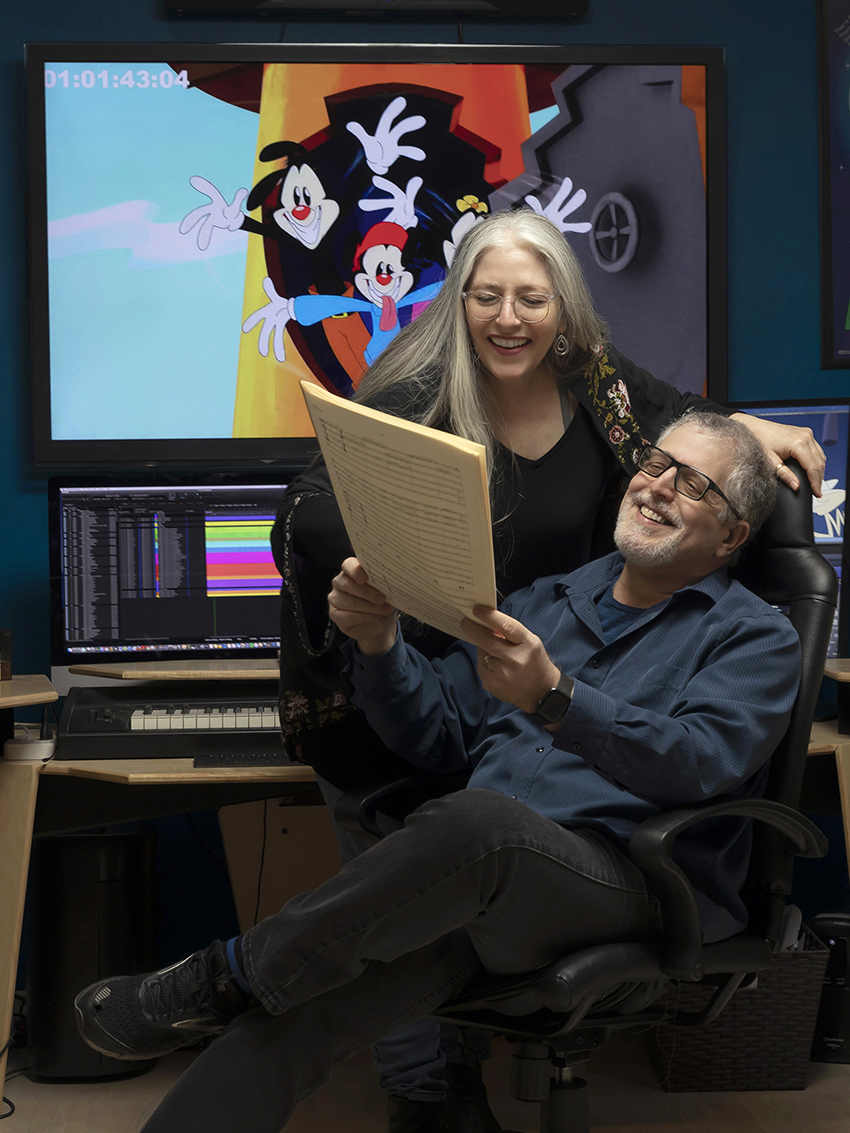
Animaniacs is an American animated comedy musical television series created by Tom Ruegger for Fox Broadcasting Company's Fox Kids block, before moving to The WB in 1995 until the series ended in 1998 as part of its Kids' WB afternoon programming block. It is the second animated series produced by Steven Spielberg's Amblin Entertainment in association with Warner Bros. Animation, after Tiny Toon Adventures. It initially ran a total of 99 episodes, along with a feature-length film, Wakko's Wish. Animaniacs is a variety show, with short skits featuring a large cast of characters.
While the show had no set format, the majority of episodes were composed of three short mini-episodes, each starring a different set of characters, and bridging segments. Hallmarks of the series included its music, character catchphrases, and humor directed at an adult audience. A revival of the series was announced by Hulu in January 2018, with at least two seasons to be produced in conjunction with Amblin Entertainment and Warner Bros. Animation, with producer Steven Spielberg, songwriter Randy Rogel, and many of the main voice actors returning, set to premiere on November 20, 2020, with a second season expected to premiere in 2021. After a 22 year hiatus, the beloved cartoon series is making a glorious comeback on Hulu starting November 20th, and the Warner Brothers are better than ever with an all-new score by original series veteran composers Julie & Steven Bernstein.
We have the luck to interview the two great composers of this amazing series : Julie & Steven Bernstein
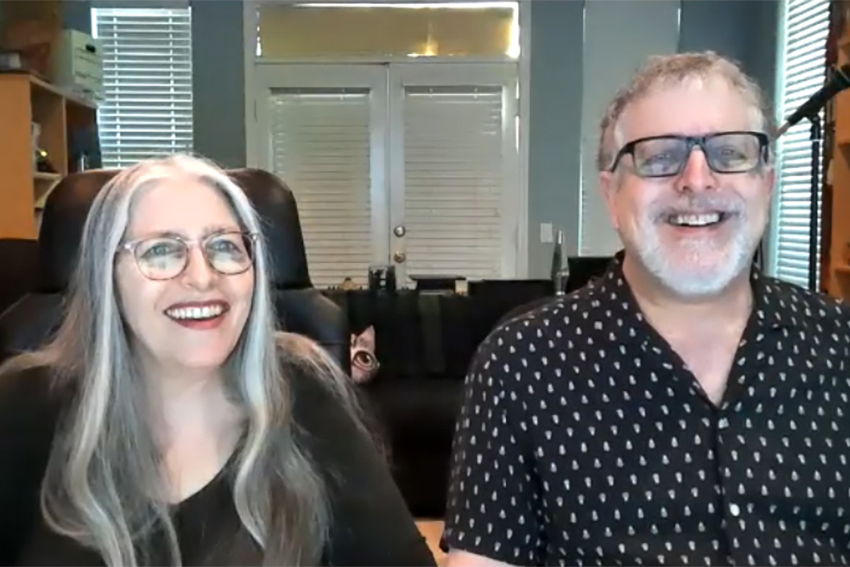
Q : Hello Julie and Steven , to begin I am a huge fan of the animations series Animaniacs and I would like to say that I am very lucky to meet the two great composers of this series. You have worked on a lot of great animated productions as Animaniacs (original series), Pinky and the Brain Baby Looney Tunes and Make Way for Noddy. You have won several Emmy awards. Please can you talk a little about your background ?
Steven Bernstein :. Bonjour, we're both classically trained composers. We have advanced degrees in music. We studied both of us studied here in California for our graduate degrees.
Julie Bernstein : We studied film scoring afterwards you know as part after studying the undergraduate music classical music as composers
Steven Bernstein : many of the teachers in the film scoring program were professionals in the industry and that's kind of how we got started because of those connections we kind of got to work little by little and establish some sort of reputation
Julie Bernstein : and a whole lot of luck. It was about being in the right place at the right time with the proper background so we got very very lucky
Q : You have composed recently the score for the upcoming new season of Animaniacs for streaming Hulu. How it feels to be be back on Animaniacs after 22 years ?
Julie Bernstein : It's amazing
Steven Bernstein : it’s good to be back with one of the highlights of our careers i think both of us
Julie Bernstein : we thought about it for 22 years
Steven Bernstein : and yet it does feel familiar because it's very much a continuation of what came before
Julie Bernstein : it was so ingrained in us for over 10 years we just had this. It was a part of us so to be back with it it just feels right and it's wonderful we're very lucky.
https://mulderville.net/images/Series/Animaniacs2020/Animaniacs interview_002.jpg
Q: What Can you tell us about your process of creating music for a series like Animaniacs?
Steven Bernstein : Sure, first we panic [Laughter]
Julie Bernstein : then we stand at the refrigerator for an hour and a half.
Steven Bernstein : No, we get the film without obviously music just with dialogue and we watch we watch it again
Julie Bernstein : and we watch together and we divide the film, we divide it into sections so that we can each go into our separate corner and write and then we bring it together and hopefully it all comes into one piece.
Steven Bernstein : once we go into our corners. We look at the film and with the help of the computer work out the timings the tempo the speed of the music so that the music works with the picture
Julie Bernstein : there are many difficult decisions to make of where the music should do certain things and so as not to not to step on a joke you know we have to really think about it a lot and sometimes you start writing and then as you go along you change what you're doing because it's not quite right you can see that it's not right
Steven Bernstein : but hopefully we get lucky the first time but sometimes not .
Q : I have recently discovered 6 of the new episods and I would like to know for you, why music is so important in this Animaniacs season ?
Julie Bernstein : i think of the music as almost another character the music is it's like a character. I also think of it as a dimension you know how we have three dimensions but on film we have two basically
Steven Bernstein : especially with animation it's still 2D animation
Julie Bernstein : two-dimensional but the music is another important or necessary dimension.
Steven Bernstein : We hope that we help highlight the emotions of the scene or indicate the emotion of the scene or the comedy of the scene um we try to set up the jokes whenever we can.
Julie Bernstein : So the hope is to accentuate what needs accentuating but not to make it obvious. One of the things of music background music is you want to disappear you don't want to be obvious although in animation music there's certain things that are very obvious but they it should go hand in hand with the movement like let's say steps if somebody's running and you're playing you want it you want it to be one thing a unit you don't want to hear oh music playing steps
Steven Bernstein : and i think that we're extremely fortunate to have an orchestra to score this show because i think it really does add a real human element to the sound and I think that's contributed to the success of the music on the show.
Julie Bernstein : It's different .
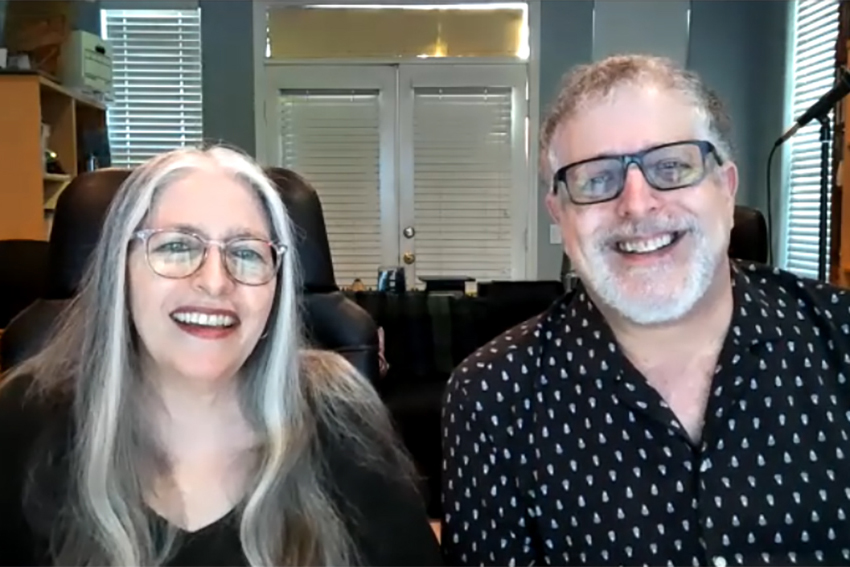
Q : What can you tell us about your work on the first episode Jurassic Lark ?
Julie Bernstein : Well of course you know that you may have recognized John Williams score from the beginning so
Steven Bernstein : the animators actually did a wonderful job in animating in basically i think it seems like they may have animated to the score which then we had to adapt with our orchestra John Williams probably had well over a hundred musicians and we had what about 35 or so about 39 i think this time but you know it's not that if the music is so wonderful that it wasn't that difficult to adapt it was it's very clear-cut and it worked so well.
Q : What must be for you a great collaboration between a director and composer? What can you tell us about your collaboration with Scott O'Brien and Katie Rice ?
Steven Bernstein : Well in terms of in general, we don't really talk to the animation directors. We do converse quite frequently with the showrunner Wellesley Wild and the co-executive producer Gabe Swarr
Julie Bernstein : those are our two our the creative connections
Steven Bernstein : and of course the music supervisor Mark White as well and we converse if we show them a draft of our music we have to preview the music we created electronically so that they can preview it and then we you know a lot of times really most of the time they say it's okay sometimes they want something a little bit different and so we go back and make the revisions so that it's a pretty good collaboration i would say now in terms of those names you mentioned we don't recognize them
Julie Bernstein : they were two people were names that we don’t recognized
Q : What was your main inspiration to create this amazing score for this upcoming season of Animaniacs ?
Julie Bernstein : well the inspiration always comes from the picture for characters characters and of course since we worked on this in the original show we have a basic vocabulary it's changed a bit but it's a basic feel you know the way it the characters have the same feel basically that they had just a little bit 22 years later but the inspiration of what we write always comes straight from the characters
Q : What must be for you the purpose of a great score and how do you found a powerful inspiration to create this score for Animaniacs?
Steven Bernstein : I think a score that for us disappears to for the listener something that will elaborate the emotions that will elicit reactions that isn't that are intended with the picture
Julie Bernstein : and what that enhances all the aspects of the film
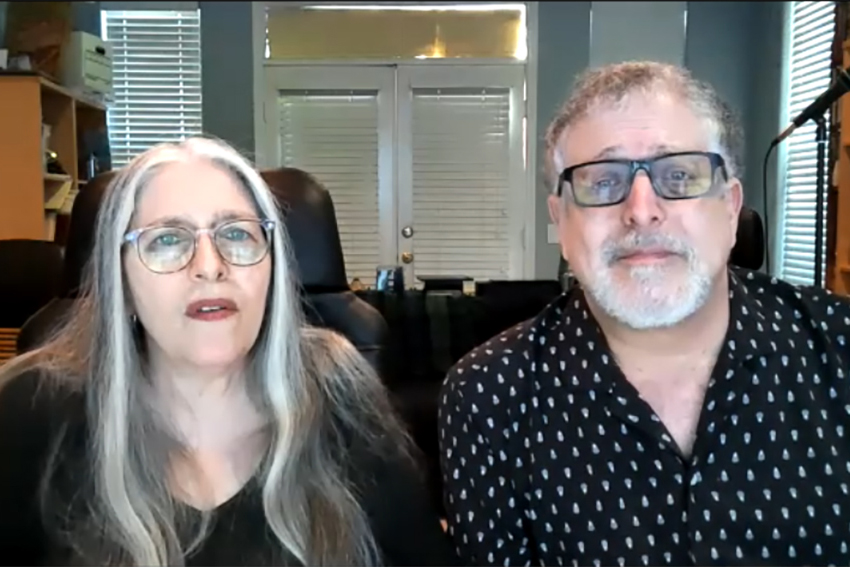
Q : which were for you the main difficulties that you have met during the creation of this Score ?
Julie Bernstein : i don't know that we have time for that.
Steven Bernstein : I think our main challenge was when the pandemic arrived we have scored the first two and a half episodes live in the studio with all the musicians and everybody together in the same room and it was a party it was wonderful and then we weren't doing that anymore so we started recording remotely and 30 musicians sent us their individually recorded parts to us and then we needed to assemble their tracks and edit them so that it sounds like a complete orchestra and of course we had the help of our brilliant engineer Damon Tedesco
Julie Bernstein : so it's still a live score we have a live score the entire first season and hopefully any seasons to come that it is live orchestra but during the pandemic, it's a different process and it's a very time consuming and very labor-intensive process but as far as writing the music is always in the way i feel it's always extremely difficult it's staring you look at a blank page even with the picture there you have a there's nothing on the score and i always find i have to dive in and begin because i don't know i always look an I think i can't write anything i don't know what's going to happen and then i start writing and it starts to come but a difficult process
Steven Bernstein : it is. I think that most creative people having to create something out of thin air . I think we all share that terror at the beginning unless the concept if unless it's an independent project and the concept is there and you can't wait to get it down on paper but for this kind of work we look at the picture like i said before we panic, we eat and then we dive in and then it comes we use our craft. I think we own the craft enough to kind of fall back on technique that allows us to start and then the inspiration will kick in
Julie Bernstein : and also certain things compositional things that help our thematic material with characters we've assigned themes to different characters or when they're new characters we, Steven and, work together to find some themes that we like and then we'll go off and using those themes makes it easier to write.
Q : Which instrument is your favorite and why ?
Julie Bernstein : Which instrument is our favorite that's very hard to say
Steven Bernstein : we love them like we love our children
Julie Bernstein : you know what i'll tell you my favorite instrument is the orchestra as an instrument it's a just the orchestra so we love i'm sure we both love
Steven Bernstein : i have to call out though in this style of this vocabulary that we've established the bassoon plays an extremely important role especially in pinky in the brain but both segments really do rely heavily on the bassoon for a long time
Julie Bernstein : it's like a character but you can't there are no instruments that really they all stand out we need the strings we need the breasts we use them all in certain ways so it's hard to say yeah it's hard to it is sort of like choosing a child..
Q : What is for you the main duty of a good composer ?
Julie Bernstein : The responsibility of a good composer is to enhance,
Steven Bernstein : to serve the story to serve the story to serve the picture these are composers of composing to image opposing to games to tv to film and any other kind of collaborative art i think it really is to serve the end product
Julie Bernstein : to enhance to enhance it to try to keep our egos in check.
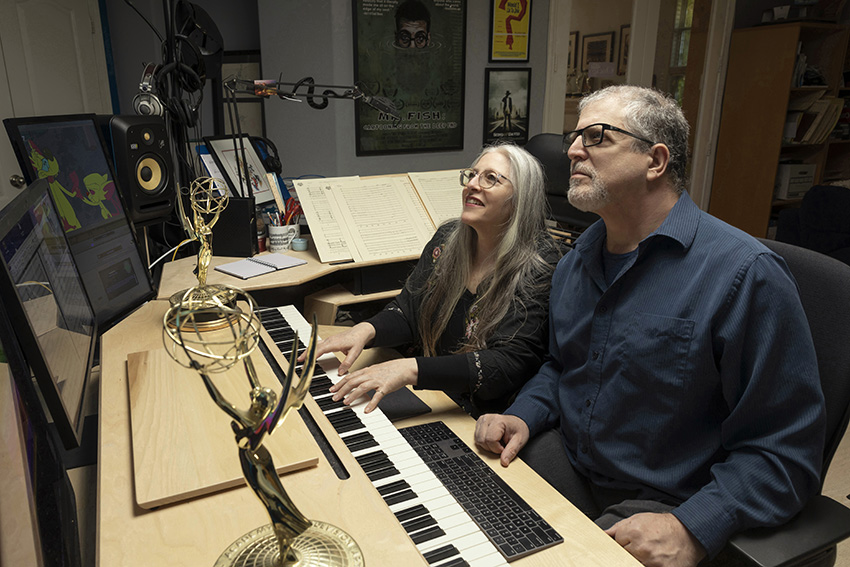
Q : In which studio do you prefer to record your score and why ?
Julie Bernstein : You mean a home studio or you mean like the live or the or like more the our live sessions we have done at warner brothers but the actual but when we write our music we are at our house even before the pandemic well we're in one room now when there are certain things that we work on together and then we sit in this room where we are now we have a keyboard and the whole set up with the computers and then when we actually write when we split off and write our separate music. I leave this room Steven is in this room and i have my own corner in another room in the house computer setup and the piano and a keyboard and
Steven Bernstein : we go off, we write what we write and then we hope that it creates a seamless hole most of the time it does and because we know where each other leaves off and begins we communicate that much
Julie Bernstein : we're writing pieces that are going to be glued together and so the person writing the one before will find out how the next one starts so that they can end theirs in a way that seamlessly goes into the start of this one and we do that over and over again to make sure that to make sure that it sounds like one piece
Steven Bernstein : with recording live instruments we really do need to divide the score into one minute one and a half minutes especially for animation for film it can be four or five minutes but for this kind of work we have to kind of divide it into smaller segments so the instrumentalists have a chance to really uh give us a good take that they always doubt i think it's easier for everybody concerned.
Q : Which American directors would you like to work with and why ?
Julie Bernstein : well we'll take Steven Spielberg who happens to be ..
Steven Bernstein : .. the executive producer on this particular show i mean the obvious favorites Martin Scorsese, Woody Allen and you know the huge one. there's so many there's .
Julie Bernstein : so many that we would be very happy to work with.
Q : Which are your current projects ?
Julie Bernstein : well right now this particular show
Steven Bernstein : we're between seasons right now we've obviously finished scoring the first season and we're kind of waiting to start up again to score the second season which i think is coming imminently. We also have some other work here and there that we do there's a comedy sketch troupe a tv show out of Utah called studio c that we've done some work for and they're wonderful folks and we've had a great time with them
Julie Bernstein : but you know it's working on this show it's this is all time consuming this is very when we're working on this that's it there's there's no time. On a pas le temps..
Q : my last question, what kind of advice could you give to someone who would like to work as a musical composer ?
Steven Bernstein : study and listen
Julie Bernstein : Listen to as much music as possible and don't give up if it's a passion if it's something that you want to do then you will do it. It's a difficult business to break into but most i think that is what most businesses are very tough to break into
Steven Bernstein : networking is hugely important but you have to have the skills to follow up any relationship and any opportunity so i think study is hugely important i mean in my case one of the best i mean besides my professors in training. I had work at one point of transcribing orchestral scores from older movies and those scores have been lost or destroyed and i had to write them down again for new performances and there's nothing better than listening and writing down. It's an incredible story
Julie Bernstein : and so yes Steven was very lucky to have that as a job but you don't need to be hired to do that you just take any score anything and listen to it and try to write it down and if you can get the written score and study it that's always good but the most the more you listen it's the ears it's the ears the more you listen the brain puts it together and
Steven Bernstein : i think besides listening you watch and listen i think if you want to be a film composer you need to see how music interacts with picture and what works what doesn't work what you like what you don't like i think that's a huge part of this job
Julie Bernstein : but also having you know it's not always so easy to be hired to do the work especially when once beginning so getting together with other musicians finding your musician friends writing something for them writing a string quartet for them writing a for a few it doesn't matter what the combination is of instruments writing something for them so that you can actually hear it because that's another thing that really helps is to find out what when you write this it sounds like that writing for a certain instrument sounds this way and so if you can gather your friends and usually anybody who plays an instrument would love to play some real music playing music they love playing you love writing and so it's a wonderful match and you get together and you write and it's it takes some motivation to get going but it's in instead of waiting for the work to come you do the work and then hope that it doesn't
Steven Bernstein : I had a professor say to me once that luck is when preparation meets opportunity so if you're prepared for the opportunities that may come up you'll keep getting work that's just kind of the way it works people you make people's jobs easier when you are successful at what you do because they don't have to worry about your aspect anymore they can hire you and know that you're going to be ok
Julie Bernstein : so you want to be totally prepared for when that day comes this is just for anybody just starting out keep on working and preparing and then when you do get that opportunity you will be completely prepared.
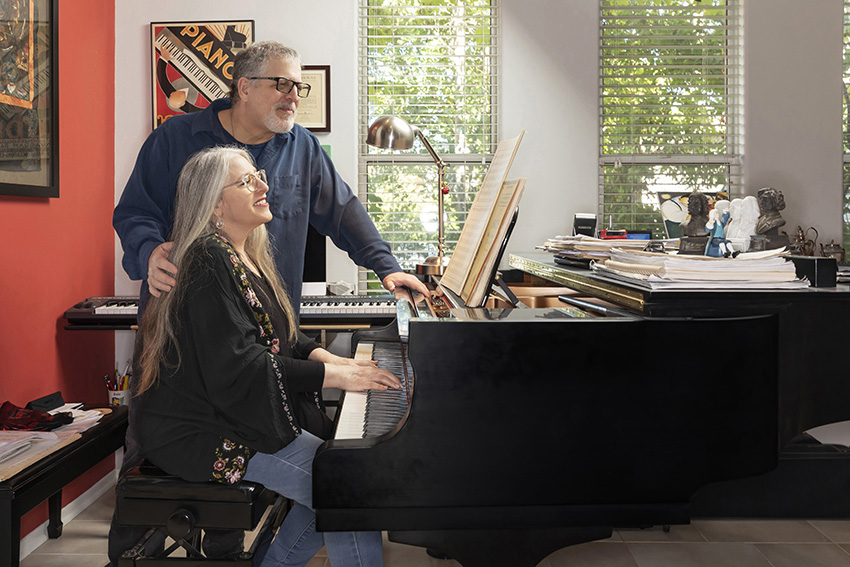
Synopsis :
The Warner siblings live in the water tower on the Warner Bros. studio lot in Burbank, California. However, characters from the series had episodes in various places and periods of time. The Animaniacs characters interacted with famous people and creators of the past and present as well as mythological characters and characters from contemporary pop culture and television. Andrea Romano, the casting and recording director of Animaniacs, said that the Warner siblings functioned to "tie the show together," by appearing in and introducing other characters' segments. Each Animaniacs episode usually consisted of two or three cartoon shorts. Animaniacs segments ranged in time, from bridging segments less than a minute long to episodes spanning the entire show length; writer Peter Hastings said that the varying episode lengths gave the show a "sketch comedy" atmosphere.
Animaniacs
Created by Tom Ruegger
Voices of Rob Paulsen, Jess Harnell, Tress MacNeille, John Mariano, Chick Vennera, Maurice LaMarche, Frank Welker, Bernadette Peters, Nancy Cartwright, Julie Brown, Laura Mooney, Sherri Stoner, Nathan Ruegger, Paul Rugg, Luke Ruegger, Cody Ruegger, Jim Cummings, Tom Bodett, Jeff Bennett
Theme music composer ! Richard Stone
Composers : Richard Stone, Steven Bernstein, Julie Bernstein, Gordon Goodwin, Carl Johnson, J. Eric Schmidt
Executive producer : Steven Spielberg
Producers : Rich Arons, Sherri Stoner, Rusty Mills, Peter Hastings
Production companies : Warner Bros. Animation, Amblin Entertainment
Distributor : Warner Bros. Television Distribution
Original network : Fox Kids (1993–1995), Kids' WB (1995–1998), Hulu (2020–)
Running time 22 minutes
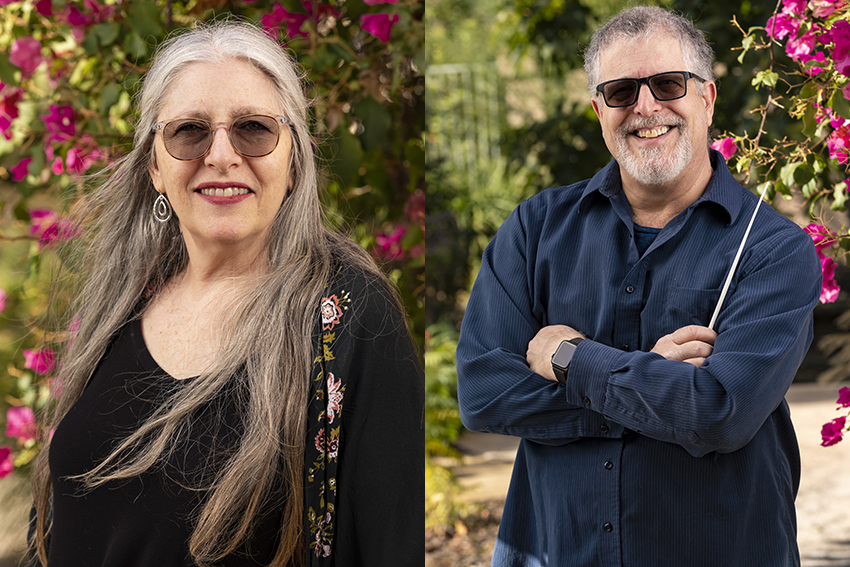
Thanks a lot to Julie & Steven Bernstein for this great interview
Thanks also to Andrew Krop
Photos : Copyright Sven Doornkaat (excep Zoom interview photos)

